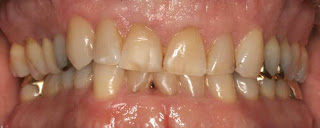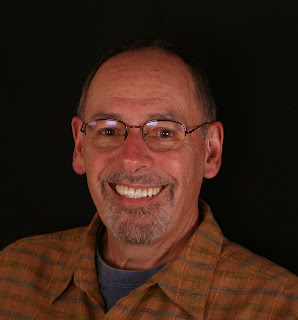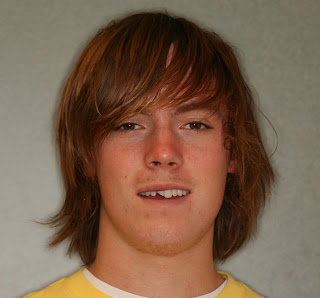
Peter’s fractured teeth, constant pain, over closure and alignment issues were all indications to Dr. Adler that Peter’s bite was not right and would continue to cause problems with his teeth until the issue was resolved. Dr. Adler recommended that Peter have a full mouth reconstruction in Boulder that would consist of neuromuscular dentistry in conjunction with cosmetic dentistry to insure that his smile would not only look good but be functional and pain free. The phase 1 of Peter’s treatment was to find his ideal bite. The ideal bite places the patient’s plan of occlusion, which is an imaginary line that runs horizontally through the bite, at a 90 degree angel to the patient’s axis of gravity to insure that the forces of gravity and the bite force are distributed equally and don’t cause undue stress or stain on joints and muscles that can effect the entire body.

A bad bite caused Peter’s muscles to become overstressed and fatigued due to the constant strain of working in the wrong position. TENS or Transcutaneous Neural Stimulation in Boulder was used to send electronic pulses to specific muscles in the face, neck, and back that allowed these overstressed muscles to elongate and come into their ideal resting positions. Peter had several TENS sessions during the course of his treatment to insure that the muscles were relaxing into their ideal positions for the best bite. In addition to the TENS, a K7 evaluation was used to help determine exactly where Peter’s ideal bite was and to monitor the progress of his treatment. The K7 evaluation entailed a) taking diagnostic casts of Peter’s mouth, b) running EMG (Electromyography) that measured his muscles at rest and during function-clench, c) CMS (Computerized Mandibular Scan) that displayed joint function, habitual freeway space, swallowing, and range of motion, d) Sonography measured joint sounds, and finally e) Myobite registration, which was an impression of Peter’s bite in its ideal position after TENS has been done. From the myobite, an orthotic was made to keep Peter in his ideal bite. TENS and any needed adjustments were made to the orthotic to make the bite as comfortable and functional as possible. Once Boulder neuromuscular dentist Dr. Adler and Peter were satisfied with Peter’s bite, phase 2 of treatment began.

Phase 2 of treatment was reconstructing Peter’s teeth to his ideal bite so that the use of the orthotic would no longer be necessary. Every tooth was prepared for a ceramic crown, removing any decay or fractures that were present, and fitted with temporary crowns while the impressions of Peter’s teeth and bite were sent to the prestigious Aurum Dental Laboratory which is known for their quality and excellence. The ceramic crowns were individually crafted to not only look great but to also be functional and in the correct bite. Once the lab finished fabrication of the crowns, Dr. Adler removed the temporaries and cemented on the permanent crowns in Boulder. Peter’s treatment was conducted under the supervision of the esteemed Las Vegas Institute (LVI) where Dr. Adler was trained in the most advanced techniques of neuromuscular and cosmetic dentistry. Peter’s results are amazing and he is thrilled with how he looks and feels. He smile is now balanced, teeth look great, and his jaw is comfortable. He said that he is more confident and the look of his entire face has changed. He looks more youthful now that the atrophy on one side of his face is gone. Another change that Peter noticed was that he stopped biting his nails since his treatment started. Peter was a habitual nail biter most of his life, since treatment Peter has completely stopped chewing on his nails and cuticles. He believed it is because his bite changed and so it is no longer as easy to bite on his nails and also because he was using his figures as a subconscious crutch for his jaw that is no longer needed with his new bite. There is no question that Peter’s smile looks great and has greatly improved his life.

For more information about Boulder Dentist Dr. Adler please visit our website or call the office at 303-449-1119.




